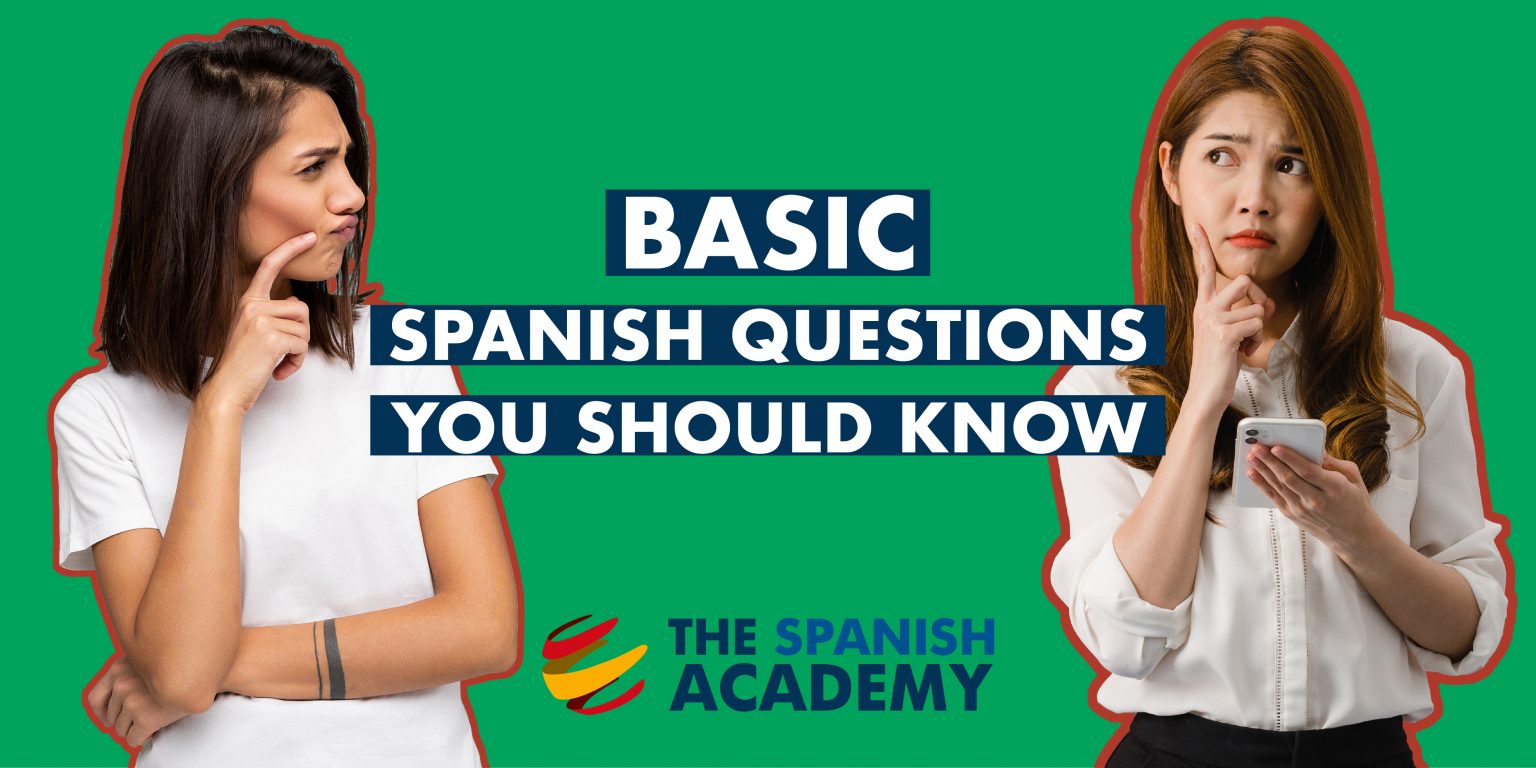All languages require a certain level of mastery when asking basic questions. And here is why we want to show you some of the basic Spanish questions you should know.
No matter what your goal is when learning Spanish, you will for sure need to know these basic questions in order to be able to communicate with Spanish-speaking people wherever you decide to travel or work.
Also, like we always tell our students in our general Spanish courses, a good strategy when you are learning Spanish is to focus on the basic Spanish question words, and then build on that foundation by adding the vocabulary you will need to speak more creatively.
And last but not least, don’t be afraid of the many ways a question may be asked! You just need to focus on the right key question word, like we show you below. And remember, the more you learn the simpler it becomes!
Spanish question words
Let’s keep it simple! Let’s go with the “what” or “which”, “where”, “when”, “who”, “why” and “how” for now! They are the most commonly used question words in Spanish and any other language. And you should start by practicing a few questions using these words.
¿Qué? or ¿Cuál? / What? … Which?
The English question word “what?” in Spanish is generally translated as “¿qué?”, but it can also be translated as “¿cuál?” or “cuáles” (in its plural form). It’s easy to get lost in this, and there isn’t a straightforward answer to when to use which.
For the multiple alternative and different uses we strongly advise you to book a free trial anytime and any of our native qualified Spanish teachers will give you an excellent explanation according to the context and situation in which you may be using “what?” or “which?”.
Examples:
- ¿Qué es eso? – What is this?
- ¿Qué profesor prefieres? – Which teacher do you prefer?
- ¿Qué quieres saber? – What do you want to know?
- ¿Cuál es la mejor escuela de español de Hong Kong? – What is the best Spanish school in Hong Kong?
- ¿Cuáles son las tapas favoritas de los españoles? – Which are the favourite tapas among Spanish people?
¿Dónde? / Where?
“¿Dónde?” translates as “where?”. But depending on the preposition you use before the question word, it may change the meaning of the question. For example, “where to?” is translated as “¿a dónde?”, whereas “from where?” is translated as “¿de dónde?”. There are many more prepositions to be used with “¿dónde?”, but we will keep it simple this time.
Also, how to say “Where is …?”. That’s a good question, and you just need to remember that most of the times you will be using the verb “estar”, and not “ser”. However, that doesn’t mean “¿Dónde es la fiesta?” is incorrect. It is the right way to ask it. But you need to ignore those poor explanations trying to simplify it all and giving wrong information. Feel free to contact us if you need further information.
Examples:
- ¿Dónde vives? – Where do you live?
- ¿Dónde está la escuela? – Where is the school?
- ¿Dónde están los mejores bares de Hong Kong? – Where are the best bars in Hong Kong?
- ¿De dónde eres? – Where are you from?
- ¿A dónde vas después de la clase de español? – Where are you going to after the Spanish class.
- ¿Hacia dónde tengo que ir? – In which direction do I need to go?
¿Cuándo? / When?
Whenever you need to know when something is happening, happened or will happen, just say “¿cuándo?”. At the very beginning you will use it talking about some events in the present. But as you move on and keep learning throughout the different levels, you will be familiarised with all the other tenses. And you will be able to ask about when the last cool event was, or when the coming Spanish event in town will be.
Examples:
- ¿Cuándo tienes clase de español? – When do you have Spanish class?
- ¿Cuándo tuviste tu primera clase de español? – When did you have your first Spanish class.
- ¿Cuándo irás a España? – When will you go to Spain?
- ¿Cuándo empieza el curso de español? – When is the Spanish course starting?
¿Quién? / Who?
If you just want to know about one specific individual, you will ask “¿Quién?”. You must, however, use the plural form (“¿Quiénes?”) of the question when addressing several individuals.
Examples:
- ¿Quién es tu profesor? – Who is your teacher?
- ¿Quiénes son tus profesores? – Who are your teachers?
- ¿Quién ha aprendido el subjuntivo? – Who has learnt subjunctive?
- ¿Quién tiene preguntas? – Who has questions?
- ¿Quienes ganaron los premios? – Who won the prizes?
¿Por qué? / Why?
If you need to know the reason of something, keep it simple and ask “¿Por qué?”. Of course, combine it with the verb tenses you master and you will be good to go. Add some vocabulary to the question and you will sound like a native.
Examples:
- ¿Por qué estudias español? – Why do you study Spanish?
- ¿Por qué decidiste estudiar español? – Why did you decide to study Spanish?
- ¿Por qué, pese a la cantidad de idiomas que existen, decidiste embarcarte en el fantástico viaje del aprendizaje del español? – Why, despite so many languages out there, did you decide to embark in the fantastic Spanish learning journey?
¿Cómo? / How?
“¿Cómo?” alone may be used to express surprise, as in “what?”. For now, translate it as “how?” which works 99% of the times. You will learn all the beautiful nuances of our language one step at a time.
Examples:
- ¿Cómo estás? – How are you?
- ¿Cómo has llegado hasta aquí? – How did you arrive here?
- ¿Cómo has ido a la escuela? – How did you go to the school?
- ¿Cómo dormiste ayer? – How did you sleep yesterday?
- ¿Cómo irás a España? – How will you go to Spain?
For further information and uses of these basic Spanish question words, do not hesitate to contact us, and don’t miss the chance to learn Spanish with the best teachers in town, 🙂
Oh! And stay tuned with all our new Instagram posts as they will be useful not only for your DELE exam preparation, but to sound like a real native, 😉
And do not miss our previous blog posts, all Spanish related to help you boost your confidence in this beautiful language and learning more about all Spanish related stuff in Hong Kong.




